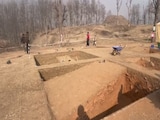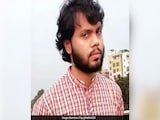The CoWin app, a "scalable, inclusive and open technological" platform developed by India, can be customized and scaled up for health interventions across the globe, Foreign Secretary Harsh Vardhan Shringla said on Tuesday.
Speaking at UNSC open debate on "Maintenance of International Peace and Security: Cyber Security," Mr Shringla said India is working on sharing the platform with partner countries.
CoWIN (Covid Vaccine Intelligence Work) is an app introduced by the Government of India for the vaccination process. It is used for registration and appointment for vaccination against COVID-19.
"As part of its Covid vaccination drive, one of the largest such drives in the world, India has developed CoWIN - a scalable, inclusive and open technological platform," Mr Shringla said in his remarks through video conferencing.
"The CoWIN platform can be customized and scaled up for health interventions across the globe. We are working on sharing this platform with partner countries," he added.
Early this month, the Indian government informed that it will soon hold a global webinar for countries interested in CoWIN platform.
During the debate, Mr Shringla said India is committed to an open, secure, free, accessible and stable cyberspace environment, which will become an engine for innovation, economic growth, sustainable development, ensure free flow of information and respect cultural and linguistic diversity.
"With our transformative technology initiatives in recent years such as IndiaStack, Aadhar and UPI, we have successfully leveraged the tremendous potential of cyber technologies in implementing the SDG agenda and improving governance," he noted.
Highlighting the growing security threats to the UN member countries emanating from cyberspace, the Foreign Secretary said the borderless nature of cyberspace and more importantly anonymity of actors involved have challenged the traditionally accepted concepts of sovereignty, jurisdiction and privacy.
Mr Shringla listed the three key challenges posed by cyberspace including use by terrorists.
He observed that terrorists around the world are using cyberspace to "broaden their appeal, spread virulent propaganda, incite hatred and violence, recruit youth and raise funds".
"Terrorists have also used social media for planning and executing their terror attacks and wreaking havoc," he added.
As a victim of terrorism, India has always underlined the need for the countries to address and tackle the implications of terrorist exploitation of the cyber domain more strategically, he said.
Mr Shringla voiced concerns over the use of cyberspace by some countries to achieve their "political and security-related objectives and indulge in contemporary forms of cross-border terrorism".
"The world is already witnessing the use of cyber tools to compromise state security through, inter alia, attacking critical national infrastructure, including health and energy facilities, even disrupting social harmony through radicalisation. Open societies have been particularly vulnerable to cyber-attacks and disinformation campaigns," he said.
Mr Shringla said the integrity and security of Information and Communications Technology (ICT) products, which form the building blocks of cyberspace, are being compromised.
"There are widespread concerns that state and non-state actors are introducing vulnerabilities and harmful hidden functions, including through backdoor channels, into ICT networks and products," he said.
"Such nefarious acts undermine trust and confidence in the global ICT supply chain, compromise security and could become a flashpoint between States. It is in the interest of the international community to ensure that all actors abide by their international obligations and commitments and not indulge in practices that could have potentially disruptive effects on global supply chains and trade in ICT products," he added.
Mr Shringla called for the adaptation of a collaborative rules-based approach in cyberspace and work towards ensuring its openness, stability and security.
He also pointed out that widening "digital gaps" and "digital knowledge gaps" amongst countries create an unsustainable environment in the cyber domain.















